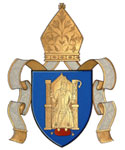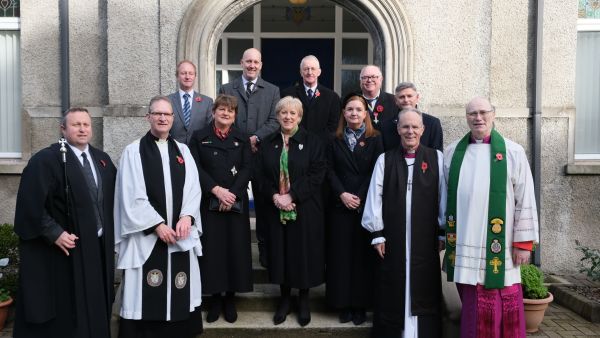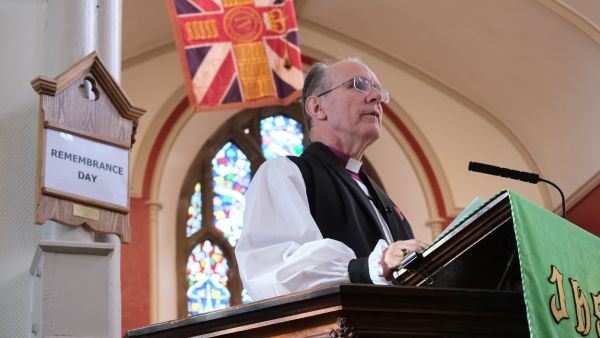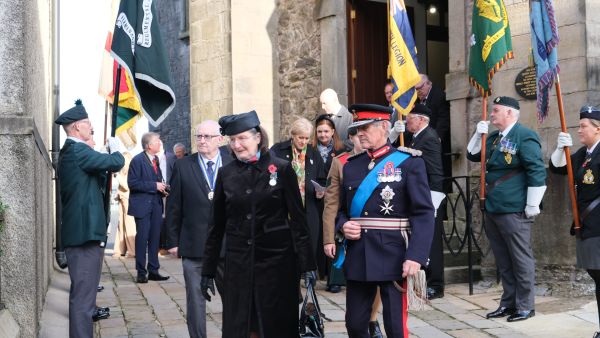 |
 |
News
Remembrance Day service in Enniskillen remembers the fallen

The guests who attended the Remembrance Day Service in Enniskillen.
The Remembrance Service from St Macartin's Cathedral, Enniskillen in conjunction with the Royal British Legion's Enniskillen Branch was held at 11.30am following the wreath-laying ceremony at the Cenotaph.
Representatives from the United Kingdom, Irish and Northern Ireland governments were present and joined by US, Canadian and Polish Consuls. These included the Secretary of State, Mr. Hilary Benn M.P. and representing the Irish Government was Mrs Heather Humphreys T.D., Minister for Social Protection.
The service was conducted by Dean Kenneth Hall with the sermon preached by the Bishop of Clogher, the Right Revd Dr. Ian Ellis.
In his sermon, Bishop Ellis said their thoughts were on those who gave their lives in defence of freedom in service to their country.

The Bishop of Clogher the Right Revd Dr. Ian Ellis preaching at the service.
'We have quite rightly remembered those killed in the first and Second World wars, the thousands of young men killed at the Somme, the Second World War in Europe fought on so many fronts, in the air on land and sea. We remember other conflicts and wars of the later 20th century - the Falklands War and the Gulf War And the wars in the Balkans, Iraq and Afghanistan.
'Earlier this year we commemorated the 80th anniversary of the battle of Normandy and recalled the courage and sacrifice of those who fought on the beaches to turn the tide of the war against Nazi Germany.
'In Northern Ireland we also recall those who lost their lives because of the troubles. Remembrance Sunday is also for us in Enniskillen a poignant reminder of the devastating 1987 bomb at the War Memorial and we recollect with great sadness the 12 individuals from this town who were killed that day; we think also of many who have carried forward scars and trauma from violence and the bereaved who continue to bear the loss of loved ones.
'Remembrance Sunday has a significant place in our national and church life. We all have different recollections in our minds as we approach this day. I personally associate Remembrance Sunday with particular sounds. When I was a boy growing up in my home church, I picked up on unique sounds which spoke to me as I was caught up in the drama and intensity of Remembrance Sunday services. I’d like to focus our minds on the key sounds of Remembrance.
1. Sound of medals jangling
'Perhaps when you are small you hear better than you see in church; recall the sound of medals jangling as older men marched down the aisle to lay a wreath at the war memorial at the back. These were men who I knew well Sunday by Sunday but on Remembrance Sunday they wore medals. They stood out as those with unique experiences, particular memories of war and of comrades lost. They represented the parish as they in a dignified way laid their wreath and bowed their heads in honour of friends and colleagues who had been lost in conflict.
Medals speak of service, of duty of courage and bravery in battle, in defence of our freedom and in service of the King and country. The sound of their medals making this small sound as we stood in quietness, spoke of their and their friends sacrificial service to this land to restore justice.
Jesus said: Blessed are those who hunger and thirst for righteousness, for they will be filled. v6
'Those who went to war, believed that they were fulfilling a just cause, bringing freedom to people who were occupied by an oppressive regime, in the cause of preventing such oppression invading our shores, and defeating evil intent. The Christian church has understood that there is such a thing as a just war, a last resort, the lesser of two evils, in the defence of the weak, and bringing justice to the oppressed who hungered for freedom.
2. Sound of the bugle
'There are stirring sounds of bugle calls on this day; The Last Post and Reveille
I have a particular memory of this from my teenage years. In our church we did not have a bugler to play at the service. Instead, we had a tape recording. Every year the rector would call at our house on the Saturday night before to give me the cassette recorder and tape and ask me to press the button on Sunday to play the recording of the two bugle calls. I was always uneasy about this task; scared I would make a mistake and not press the right button or stop it at the wrong moment. Nervously hold my finger over the buttons and wait for my cue!
The bugle call Last Post is played just before the two minutes silence. Reveille is played to break the silence after the two minutes.
'The origin of these calls is interesting. The 'First Post' call signals the start of the duty officer's inspection of a British Army camp’s sentry post, sounding a call at each one. First published in the 1790s, the 'Last Post' call originally signalled merely that the final sentry post had been inspected, and the camp was secure for the night.
In military tradition, the Last Post is the bugle call that signifies the end of the day's activities. It is also sounded at military funerals to indicate that the soldier has gone to his final rest.
'Reveille is a musical signal to waken soldiers early in the morning. It speaks of the trumpet call on the last day too when the dead in Christ will rise with him. It is a signpost to resurrection.
The Last Post and Reveille are such stirring pieces of music; they transport us to the battle fields, to the graveyard as soldiers were laid to rest, to solemn services such as this of remembrance, as we remember the sacrifice of so many young men and women. The bugle calls and point us to the hope of resurrection to new life in Christ.
Jesus said: Blessed are those who mourn, for they will be comforted v4.
'The ultimate hope and comfort we hold on to is that those who die in the Lord will share eternal life with him. All whose faith is in Christ will be joined with him in his wonderful resurrection. Those who mourn the loss of a loved one or who mourn some other loss in their lives can but hold on to the risen Christ for hope in life and in a world to come.
3.Sound of silence or the absence of sound
'The two minutes for a child two minutes seems like two hours. For all of us, to stand without sound for two minutes helps us focus, it helps our minds to gather thoughts, and to remember that those who fought did not have the luxury of silence. Their sacrificial service on the battlefield had the soundscape of guns and explosions.
War poets expressed this well: Anthem for Doomed Youth by Wilfred Owen
What passing-bells for these who die as cattle?
' Only the monstrous anger of the guns.
Only the stuttering rifles' rapid rattle
Can patter out their hasty orisons.
No mockeries now for them; no prayers nor bells;
Nor any voice of mourning save the choirs,
The shrill, demented choirs of wailing shells;
And bugles calling for them from sad shires.
'There was anything but silence on the battlefields of the 1st and 2nd world wars, deafening sounds of the machinery of warfare and its devastation explosions. We hear that thunder of war still today through our television news coverage of missile attacks in Gaza, Israel and Lebanon.
'Silence clears our minds and helps us concentrate on the terrible effects of war, although at times a last resort, war takes its toll: on the youth of the age, its destruction of life and infrastructure, and impact on the environment. We recall too the effects of war on the survivors, the many who suffered from what we could call PTSD today.
'In a wider thought, we pray today that mankind might be determined to learn the lessons of war and urge that we resort first to peaceful means of resolving conflict rather than the uptake of arms. This though is the most difficult thing to do as we know observing the present conflict in the middle East. Diplomacy at present seems to be powerless.
'A recent BBC Hard talk interview with Martin Griffiths, former UN secretary for Humanitarian Affairs discussed the human cost of warfare and the difficulties in finding diplomatic solutions to conflict in areas such as the Sudan and Middle East. As he reflected on his career in diplomacy he said: ‘The percentage success in finding peaceful diplomatic solutions in war situations is very low. You must accept this level of failure, yet don’t give up ,you gain experience and go again, don’t walk away from the problem, just work harder to find a way of moving forward with the basis of the best of human nature behind you’. In Christian terms we might say ‘pray and work again’ for peaceful solutions and for the efforts of peacemakers and keepers.
'Jesus said: Blessed are the peacemakers for they will be called the children of God v9
'The Beatitudes, we heard read today, from St Matthew’s Gospel, are part of the Sermon on the Mount that our Lord gave his disciples a sermon in which he defines the characteristics of the Kingdom of God. This is the way disciples are to be and act in their interactions with others. Today I have chosen just three of the nine beatitudes because within these three are important messages which resonate with the season of Remembrance. However, they go much further in their application than these days of solemn reflection of times of war. This passage is a manifesto for Christian living, it calls us to reshape our outlooks and main concerns. The sermon teaches us, that when we prioritise the sorts of people whom Christ call ‘blessed’, the kingdom of God will begin to be seen among us.
'So as we listen out for key sounds to accentuate our remembrance on this special day, may we learn to listen out for those other sounds to be heard across the world, the cries of those who yearn for peace in their lives, the petitions of those who ask for the basics of living, shelter and food, the longings of those who seek a better future, the pained cries of those who suffer, the weeping of the bereaved, the yearning of those who seek mercy, the ache of the hungry and wounded, the call of those persecuted for pursuing righteousness.
Jesus teaches us in his word today that when we put these people at the heart of our vision for the world and for society, when we listen to them, we are listening to God’s heart for the world.
‘and after Jesus had sat down, his disciples came to him, and he began to speak and taught them..’
'Are we listening to his voice?'
The readings were by Mr. John Jones, Chairman, Enniskillen Branch of the Royal British Legion; Viscount Brookeborough, Lord Lieutenant for Fermanagh and Monsignor Peter O'Reilly, of St. Michael's Roman Catholic Church.
The hymns were; 'Guide me, O thou great Jehovah;' 'I vow to thee, my country, earthly things above;' 'You kingdom come, O God,' 'Lord, while for all the world we pray,' 'Be thou my vision, O Lord of my heart' and 'Nearer, my God, to thee, nearer to thee.'
The organist was Mr. Glenn Moore.
The Last Post and Reveille were sounded by Mr. Warren Kerr, Ballyreagh Silver Band and the Piper's Lament was played by Pipe Major Gordon McKeown, 4 UDR Association.
During the Act of Remembrance, Lt. Col. Mark Scott(Ret'd) MBE, DL Royal Inniskilling Fusiliers turned a page in the Book of Remembrance and laid a poppy wreath.

Lord and Lady Brookeborough lead the guests from the Cathedral after the service.